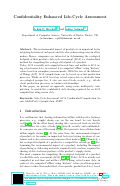Confidentiality Enhanced Life-Cycle Assessment
Achim D. Brucker und Sakine Yalman
 The environmental impact of products is an important factor in buying decisions of customers and it is also an increasing concern of law makers. Hence, companies are interested in determining the ecological footprint of their products. Life-cycle assessment (LCA) is a standardized method for computing the ecological footprint of a product.
The environmental impact of products is an important factor in buying decisions of customers and it is also an increasing concern of law makers. Hence, companies are interested in determining the ecological footprint of their products. Life-cycle assessment (LCA) is a standardized method for computing the ecological footprint of a product.
Today, LCA is usually not computed in real-time and neither is LCA using actual sensor data: in contrast it is computed "offline" using "historic" values based on exemplary measurements. With the rise of the Internet of Things (IoT), LCA computations can be based on actual production processes. While an LCA based on actual sensor data is desirable from an ecological perspective, it also can reveal trade secrets, e.g., details about production processes or business relationships.
In this paper, we present an approach, using secure multi-party computation, to enable the confidential data sharing required for an LCA computation using sensor data.
Schlüsselwörter:
Kategorien: ,
Dokumente: (Artikel als PDF Datei)
 Bitte zitieren sie diesen Artikel wie folgt:
Bitte zitieren sie diesen Artikel wie folgt:
Achim D. Brucker und Sakine Yalman.
Confidentiality Enhanced Life-Cycle Assessment.
In BPMN 2021 Workshops. Lecture Notes in Business Information Processing (LNBIP), Springer-Verlag, 2021.
(Artikel als PDF Datei) (BibTeX) (Endnote) (RIS) (Word) (
 )
)
| abstract | = | {The environmental impact of products is an important factor in buying decisions of customers and it is also an increasing concern of law makers. Hence, companies are interested in determining the ecological footprint of their products. Life-cycle assessment (LCA) is a standardized method for computing the ecological footprint of a product.\\\\Today, LCA is usually not computed in real-time and neither is LCA using actual sensor data: in contrast it is computed ``offline'' using ``historic'' values based on exemplary measurements. With the rise of the Internet of Things (IoT), LCA computations can be based on actual production processes. While an LCA based on actual sensor data is desirable from an ecological perspective, it also can reveal trade secrets, e.g., details about production processes or business relationships.\\\\In this paper, we present an approach, using secure multi-party computation, to enable the confidential data sharing required for an LCA computation using sensor data.}, | |
| address | = | {Heidelberg}, | |
| author | = | {Achim D. Brucker and Sakine Yalman}, | |
| booktitle | = | {BPMN 2021 Workshops}, | |
| editor | = | {Andrea Marrella and Barbara Weber}, | |
| language | = | {USenglish}, | |
| = | {https://www.brucker.ch/bibliography/download/2021/brucker.ea-confidential-lca-2021.pdf}, | ||
| publisher | = | {Springer-Verlag}, | |
| series | = | {Lecture Notes in Business Information Processing (LNBIP)}, | |
| title | = | {Confidentiality Enhanced Life-Cycle Assessment}, | |
| url | = | {https://www.brucker.ch/bibliography/abstract/brucker.ea-confidential-lca-2021}, | |
| year | = | {2021}, |

